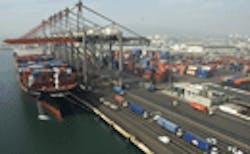Global logistics market still contracting, consolidating
A new study finds that the ongoing worldwide economic recession continues to afflict the global logistics industry, resulting in a still-shrinking market for logistics services. That in turn is leading to more collaboration and consolidation among logistics companies.
“Fluctuating demand, the liquidity crunch in the market as well as this narrow focus on industry sectors, has put logistics service providers (LSPs) in a challenging situation,” said Prasanna Sriraman, a research associate with Frost & Sullivan. “As most sectors including automotive, retail and consumer electronics are affected by the recession, so too are the LSPs that serve them. In addition, some LSPs focus only on particular sectors, which when affected, pulls the LSP down along with the market.”
Frost & Sullivan’s recent report, titled “Global Logistics and Transportation Industry Outlook 2009: Impact of Economic Slowdown on the Future of The United States, The European Union and The Asia Pacific,” found that LSPs overall are facing a tough time and must collaborate or consolidate in order to survive.
“LSPs and end user companies related to different industry sectors must collaborate among themselves and with their suppliers to create the economies of scale needed to survive the ongoing crisis,” said Sriraman.
“Likewise, producers of goods within the same industry must co-operate, ignoring the need to make competitive gains, to ensure full container loads, thereby reducing costs,” Sriraman added. “Similarly, LSPs must collaborate to offer services that would reduce operating costs and optimize asset usage. This would bring about the much needed cost reductions that could be passed on to consumers, in turn increasing market demand.”
Frost & Sullivan’s findings buttress research conducted earlier this year that shows the logistics market continues to undergo major change brought on by the global economic downturn.
For example, the 16th annual “3PL Provider CEO Perspective” survey authored by Professor Robert Lieb of supply chain management studies at Northeastern University found that supply chains worldwide are shortening or being relocated altogether. This trend has been called “reverse globalization” in that there is a shift of manufacturing activities away from Asia and back to North or Central America or Europe.
Lieb noted that 20 of the 35 CEOs that responded to this survey reported that some of their major clients had shifted some of their manufacturing activities from Asia to North or Central America or Eastern Europe. “The scale of that shift is small at this point, but many of the CEOs expect the trend to grow over the next several years as many companies seek to shorten supply chains,” he explained.
About the Author
Sean Kilcarr
Editor in Chief
Sean Kilcarr is a former longtime FleetOwner senior editor who wrote for the publication from 2000 to 2018. He served as editor-in-chief from 2017 to 2018.
